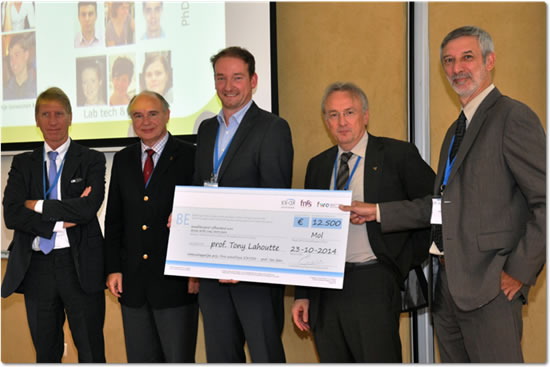
Tony Lahoutte wins SCK•CEN Scientific Award
‘Prof. Roger Van Geen’
On 23 October 2014, the biennial Prof Roger Van Geen Prize was awarded at the Belgian Nuclear Research Centre (SCK•CEN).
This year the distinction goes to:
Professor Tony Lahoutte
The jury recognised his work on molecular imaging with nanobodies,
which makes a major contribution to the field of oncology and inflammatory and cardiovascular diseases.

From left to right: Professor Paul De Knop, VUB rector, Professor Derrick P. Gosselin, Chairman of SCK•CEN's Board of Governors, Professor Tony Lahoutte, AZ VUB, Professor Eric van Walle, SCK•CEN Director General, Professor Dirk Ryckbosch, UGent
Molecular Imaging using Nanobodies
Molecular imaging is aimed at the study of molecular and cellular events in intact living subjects. At present, nuclear imaging is the most sensitive and accurate method for molecular imaging. It requires the administration of a targeting probe labelled with a radioisotope. In the last five years we have developed radiolabelled nanobodies for molecular imaging applications.
Nanobodies are recombinant proteins that are derived from a particular type of antibodies that exist in the blood of camelids (llama, camel, etc.). In contrast to conventional antibodies that exist in all mammals, the camelid 'heavychain antibodies' (HCAbs) lack a light chain and bind to foreign structures with a single domain called the VHH. This VHH (also called 'nanobody') can be easily produced in bacteria or yeast in large quantities, is very stable and binds to the antigen with high affinities and specificities. Since they are very small, nanobodies penetrate efficiently into dense tissues and an unbound nanobody is eliminated rapidly.
As a result, radiolabelled nanobodies generate very high specific contrast at the targeted site as early as 1 hour after administration. A substantial set of research results (20 publications and 3 patent applications) has been obtained for the development of new molecular imaging tracers based on nanobodies with applications in oncology, inflammatory and cardiovascular disease. This work has been the basis for the translation from bench to bedside of 68Ga-anti HER2 Nanobody: the first clinically tested nanobody for molecular imaging of HER2 expression in breast cancer patients.
SCK•CEN Scientific Award “Prof. Roger Van Geen”
Promoting scientific research in the field of nuclear energy is one of the priorities of the Belgian Nuclear Research Centre (SCK•CEN). SCK•CEN's patronage makes it possible for the Research Foundation – Flanders (FWO), in cooperation with the Fonds de la Recherche Scientifique (F.R.S.-FNRS), to grant the biennial scientific award “Prof. Roger Van Geen”. This scientific award of €12,500 is granted every two years to a postdoctoral researcher for outstanding academic research in the field of nuclear energy or radiation. This award should also stimulate collaboration between the Belgian universities, research institutes and SCK•CEN.
Both technically oriented research and studies on the socio-economic aspects of nuclear energy may apply for this award. The submitted work should fit in with or have a potential link to SCK•CEN's research topics.
Prof. Roger Van Geen (1935-1995)
Prof Roger Van Geen obtained the degree of Licentiate in Physics and Doctor of Sciences at ULB. Later he was professor and dean at the Sciences and Applied Sciences Faculty of VUB (Brussels), where he was appointed rector in 1974. During his rectorate the VUB University Hospital was opened and the construction of an oncological centre and a children’s hospital was started.
In 1975, Prof Van Geen joined the Board of Directors of SCK•CEN. In 1989, he was appointed Managing Director, and as of 1991 was appointed Chairman. Prof Van Geen left a decisive mark on SCK•CEN's scientific ambitions and made a major contribution to the development of a big network of international relations. He also built bridges between politics and human sciences.
|

